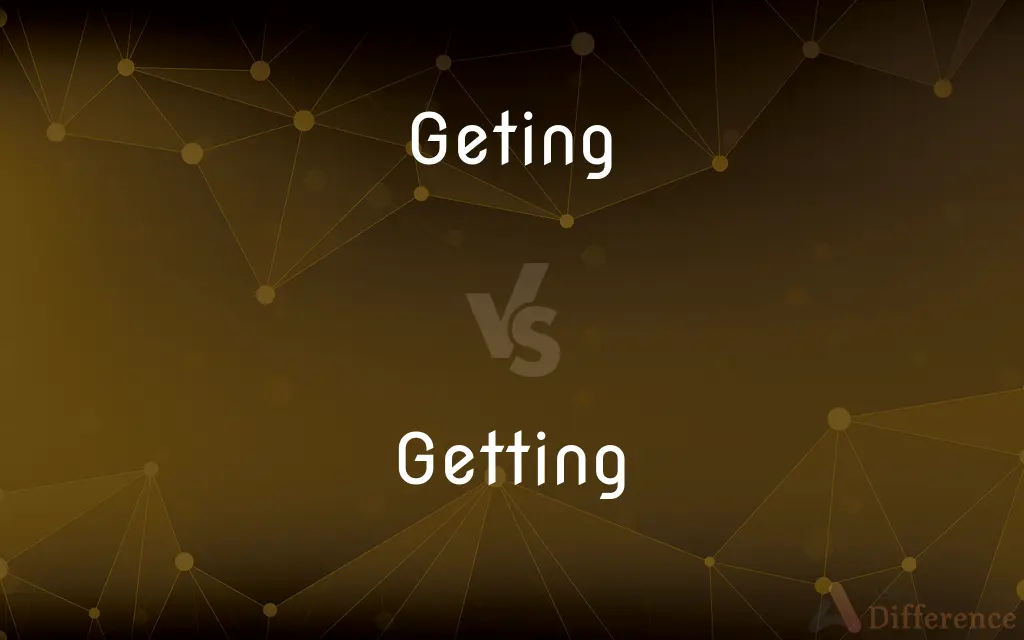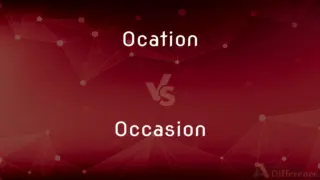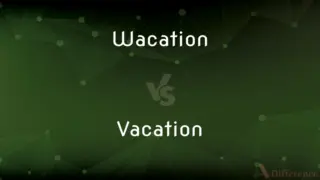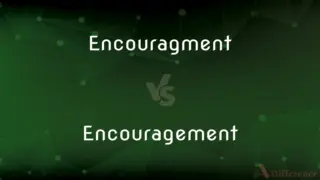Geting vs. Getting — Which is Correct Spelling?
By Tayyaba Rehman — Updated on March 21, 2024
"Geting" is the incorrect spelling, while "Getting" is correct. "Getting" is the present participle of "get," implying the action or process of obtaining or achieving something.

Table of Contents
Which is correct: Geting or Getting
How to spell Getting?

Geting
Incorrect Spelling

Getting
Correct Spelling
ADVERTISEMENT
Key Differences
Recall that doubling the consonant after a short vowel in English verbs is standard, as in "hop" becoming "hopping."
Think of "setting" or "letting"; the same rule applies.
Remember it as "get" + "ing."
Visualize the word "get" with a small "ting" bell beside it, emphasizing the sound of "getting."
Create a rhyme or jingle: "When 'get' is in motion, add an extra 't' for devotion."
ADVERTISEMENT
How Do You Spell Getting Correctly?
Incorrect: He is geting better at playing the guitar.
Correct: He is getting better at playing the guitar.
Incorrect: We are geting closer to finding a solution.
Correct: We are getting closer to finding a solution.
Incorrect: I am geting a new book this afternoon.
Correct: I am getting a new book this afternoon.
Incorrect: She is geting ready for her trip next week.
Correct: She is getting ready for her trip next week.
Incorrect: They are geting excited about the upcoming concert.
Correct: They are getting excited about the upcoming concert.
Getting Definitions
The act of arriving or reaching a destination.
We're getting closer to the city center.
The act of becoming involved or engaged with something.
He's getting into painting as a new hobby.
The act of obtaining or acquiring.
She's getting a new dress for the party.
Used to describe one's understanding or realization of something.
I'm getting the idea that he doesn't want to be here.
The process of becoming or starting to be in a particular state or condition.
I'm getting tired of this routine.
Present participle of get
The act of obtaining or acquiring; acquisition.
That which is got or obtained; gain; profit.
The act of acquiring something;
I envied his talent for acquiring
He's much more interested in the getting than in the giving
Getting Meaning in a Sentence
He's getting tired of the same routine every day.
Getting an education is important for your future.
She's getting a new puppy for her birthday.
He's getting a promotion at work because of his hard work.
They are getting married next summer.
She's getting ready to run her first marathon.
The weather is getting warmer as summer approaches.
I'm getting excited for the holiday season.
You're getting too far ahead of yourself.
I'm getting better at understanding complex math problems.
It's getting late; we should head home.
I'm getting a feeling that something great is about to happen.
We're getting closer to our goal of saving enough money for a house.
They're getting the hang of speaking a new language.
I'm getting together with old friends this weekend.
The situation is getting out of hand; we need to act now.
He's getting into shape by going to the gym regularly.
She's getting a new car next month.
He's getting a grasp on the fundamentals of coding.
They're getting ready to launch their new product.
The kids are getting bigger every day.
She's getting a bit worried about the test results.
The project is getting off the ground, finally.
We're getting all the details sorted out for the trip.
The movie is getting rave reviews from critics.
Getting Idioms & Phrases
Getting cold feet
To suddenly become too frightened to do something you had planned to do.
She was excited about skydiving but started getting cold feet when the plane took off.
Getting your ducks in a row
To organize your tasks and schedules efficiently.
Before we launch the business, we need to get our ducks in a row.
Getting the ball rolling
To start something, especially something big or important.
Let's get the ball rolling on this project with a brainstorming session.
Getting up on the wrong side of the bed
To start the day in a bad mood.
He's been grumpy all day; must have gotten up on the wrong side of the bed.
Getting a second wind
Finding new strength or energy after being tired.
I was exhausted after 10 miles, but then I got a second wind and finished the marathon.
Getting to the heart of the matter
To focus on the most important part of a situation.
It's time we got to the heart of the matter and discussed our real concerns.
Getting a taste of your own medicine
To experience the same unpleasantness that you've given others.
After years of teasing his sister, he finally got a taste of his own medicine.
Getting the green light
To receive permission to start or continue with a project.
We're just waiting to get the green light from management to begin work.
Getting wind of something
To hear a piece of information that someone else was trying to keep secret.
She got wind of the surprise party her friends were planning.
Getting out of hand
Becoming difficult to control.
The party was getting out of hand, so we called the police.
Getting the short end of the stick
To receive the worst part of a deal.
He felt like he got the short end of the stick in their divorce settlement.
Getting the axe
To be fired from a job.
He got the axe after the company decided to downsize.
Getting a leg up
To gain an advantage.
Interning at the company gave her a leg up when applying for a full-time position.
Getting your feet wet
To begin to participate in an activity for the first time.
Volunteering at the event is a great way for new members to get their feet wet.
Getting a head start
To start something ahead of others.
I like to get a head start on my homework right after school.
Getting on in years
Becoming old.
The family dog is getting on in years but still enjoys short walks.
Getting your act together
To start to organize yourself so that you do things in an effective way.
You need to get your act together if you want to pass your exams.
Getting under someone's skin
To annoy someone.
He's always late, and it's really getting under my skin.
Getting over the hump
To get past the most difficult part of something.
Once you get over the hump of the first few chapters, the book becomes a lot easier to read.
Getting the hang of it
To begin to understand how to do something.
After a few lessons, he's really getting the hang of playing the piano.
Common Curiosities
What is the pronunciation of Getting?
It is pronounced as /ˈɡɛtɪŋ/.
Which vowel is used before Getting?
No specific vowel is typically used before "Getting."
Why is it called Getting?
It is called "Getting" because it is the present participle form of the verb "get," indicating the action or process of obtaining, becoming, or understanding.
What is the verb form of Getting?
"Getting" is the present participle of the verb "get."
What is the plural form of Getting?
"Getting" does not have a conventional plural form as a verb, but if used as a noun (in specific contexts), it remains "gettings."
What is the root word of Getting?
The root word is "get."
What is the singular form of Getting?
"Getting" is already in its singular form.
Is Getting a noun or adjective?
"Getting" primarily functions as a verb but can also act as a noun in some contexts.
Which conjunction is used with Getting?
Any conjunction can be used with "Getting" depending on the sentence structure, such as "and," "but," "or."
Which article is used with Getting?
Both "a" and "the" can be used with "Getting" depending on the context.
Is Getting a negative or positive word?
"Getting" is neutral; its positivity or negativity depends on context.
Is Getting a vowel or consonant?
"Getting" is a word, not a single letter, so it consists of both vowels and consonants.
Is Getting a collective noun?
No, "Getting" is not a collective noun.
Is the word Getting is imperative?
No, "Getting" is not in the imperative form.
Is the word Getting is Gerund?
Yes, "Getting" is a gerund.
How many syllables are in Getting?
There are two syllables in "Getting."
What is another term for Getting?
Obtaining, acquiring, receiving.
What is the first form of Getting?
The first form is "get."
Which preposition is used with Getting?
Various prepositions can be used with "Getting," depending on the context. Examples include "getting on," "getting into," "getting out of."
Is Getting an adverb?
No, "Getting" is not an adverb.
How do we divide Getting into syllables?
It is divided as Get-ting.
Which determiner is used with Getting?
It depends on the context. Determiners like "the," "this," and "my" can be used with "Getting."
Is Getting an abstract noun?
Not typically, but it can be used as a noun to represent an abstract action in some contexts.
Is the Getting term a metaphor?
No, but it can be used within metaphorical expressions.
What is a stressed syllable in Getting?
The first syllable, "Get," is stressed.
What is the second form of Getting?
The second form is "got."
How is Getting used in a sentence?
She is getting ready for the party.
Is Getting a countable noun?
When used as a noun (rarely), it's uncountable.
Is the word “Getting” a Direct object or an Indirect object?
"Getting" can be part of a verb phrase. Whether it's a direct or indirect object depends on its use in a sentence.
What part of speech is Getting?
"Getting" is primarily a verb but can also be a noun.
What is the third form of Getting?
The third form is "gotten" (in American English) or "got" (in British English).
What is the opposite of Getting?
Losing, relinquishing.
Share Your Discovery

Previous Comparison
Pundint vs. Pundit
Next Comparison
Ocation vs. OccasionAuthor Spotlight
Written by
Tayyaba RehmanTayyaba Rehman is a distinguished writer, currently serving as a primary contributor to askdifference.com. As a researcher in semantics and etymology, Tayyaba's passion for the complexity of languages and their distinctions has found a perfect home on the platform. Tayyaba delves into the intricacies of language, distinguishing between commonly confused words and phrases, thereby providing clarity for readers worldwide.













































